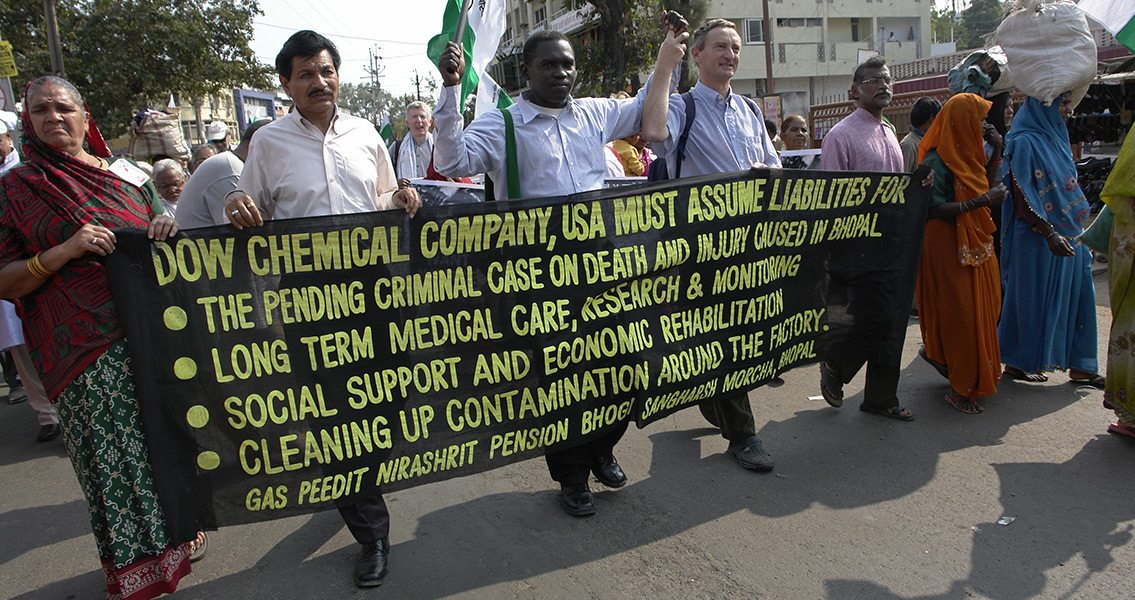<![CDATA[On 3rd June, 1988, the US based chemical company Union Carbide announced its refusal to pay $192 million in relief payments to victims of the 1984 gas leak disaster in Bhopal. The disagreement between the Supreme Court of India and the US company was just one step in the long legal dispute over responsibility and compensation for one of the worst industrial disasters in history. The disaster started on the night of 2nd December, 1984, when the Union Carbide pesticide manufacturing plant in Bhopal, central India, began leaking up to 30 tons of methyl isocynate - a poisonous gas. Failure to meet standards of maintenance and care at the plant meant that the security mechanisms responsible for preventing such a leak were not functioning, and the gas was released into the air supply of the local area. More than 600,000 people living in the densely packed shanty towns surrounding the plant were exposed to the poisonous gas cloud that evening. Weather conditions meant the cloud moved slowly and remained close to the ground; causing the victims' eyes and throats to burn, triggering nausea, and in many cases proving fatal. Estimates for the death toll from the disaster range from 3,800 to 16,000. The figure currently referred to by the Indian government is 15,000 fatalities as a direct result of the initial leak, although this number is contested by activist groups campaigning for greater compensation for Bhopal. Toxic material remains in Bhopal, and in the decades since the disaster many of those who were exposed to the gas have given birth to mentally or physically disabled children. Indian officials estimate that up to 50,000 people were left permanently disabled as a result of the leak. Bhopal locals have been campaigning for decades to have the area properly cleaned, but Human Rights Groups say thousands of tons of hazardous waste are still buried there. Legal action against Union Carbide followed soon after the disaster. The community of Bhopal initially tried to litigate through US courts, but it was ruled in 1986 that they would have to pursue their claims against Union Carbide in the Indian legal system. The Indian Supreme Court ruled that Union Carbide should pay $192 million in relief compensation to the people of Bhopal to begin the process of repairing the damage done by the disaster while the trial continued. Union Carbide refused to make the relief payments, claiming, "The needs of the victims will be fully addressed only in the context of a final resolution of all issues." The reasons for this refusal are complicated, but seem to revolve around an attempt by the US company to limit its liability in the case. At this point it had yet to disclose a list of the chemicals in the plant, possibly because in 1988 the death toll from the leak was still rising. Union Carbide appears to have been holding out for a definite figure to be placed on the number of casualties before accepting any responsibility. A settlement was finally reached in 1989, with the Indian Supreme Court ordering Union Carbide to pay $470 million in compensation to the victims of the Bhopal disaster (the Indian government had originally demanded $3 billion). In 2006, the Bhopal Welfare Commission claimed that it had paid out compensation on all of the claims it had received. However, protesters continue to argue that the Indian government has failed to appreciate the true environmental and human costs of the tragedy and has therefore penalised Union Carbide insufficiently. Matters have been complicated following Union Carbide's acquisition by the Dow Chemical Company in 2001, with the new owners claiming they are not liable for Union Carbide's actions. Since the settlement of 1989, protests have taken place regularly in India, most recently on the 30th anniversary of the tragedy last year, to pressure the government into seeking more compensation from Dow Chemical. Satinath Sarangi, from the Bhopal Group for Information and Action, told the BBC in 2014, "About 93% of victims were left out of compensation". Over thirty years after the terrible disaster, the push for compensation led by a host of activist groups is still ongoing. Image courtesy of Wikimedia Commons user: Yann (talk)]]>
Union Carbide Refuses Bhopal Relief Payments
